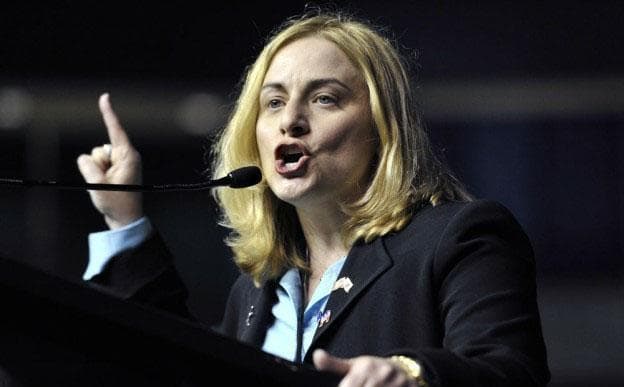Advertisement
DeFranco Pushes For Spot On Primary Ballot
Resume
The fight over which Democratic candidate is best to go up against Sen. Scott Brown takes center stage this weekend. On Saturday in Springfield, the state's Democratic delegates will cast votes for either Elizabeth Warren or immigration attorney Marisa DeFranco at the Massachusetts Democratic Convention.
Party leaders say DeFranco will likely get the 15 percent of the delegate vote required to make the primary ballot this September, but some Democrats are worried it could divide the party's attention when it should be focusing on Brown.
WBUR's Morning Edition host Bob Oakes met with DeFranco at her campaign headquarters to discuss the issues and what she thinks of her chances.
Marisa DeFranco: I never learned in my history class or American government class that primaries were a bad thing. Primaries came out of the beginning of the 20th century when people were tired of party bosses picking the candidate in the back room, full of smoke. And the point of a primary is to vet the candidate — [to] see who the strongest person is to go up against Scott Brown. I believe my message is going to resonate better and I know that I'm going to connect with voters the best.
Bob Oakes: Do you think that the Democratic Party machine — the smoke-filled room, so to speak — is trying to deny you?
Well, let's just say that I'm not the machine candidate. I am the candidate who is beholden to nobody except for the voters. And that is the essence of democracy and I think that shutting down process is what makes our party weaker. Embracing the process and vetting the candidate is what works.
So are you calling out Elizabeth Warren and suggesting that she needs to be vetted?
Oh, I'm not calling her out on anything. I'm saying that this primary contest has not even yet begun. Look, we haven't even begun to scratch the surface of foreign policy issues. We haven't talked about comprehensive immigration reform. Most importantly, we haven't talked about jobs. Let's have a serious discussion of... how to get this economy going again.
Let's talk about some of the issues. What should Congress do, what does Congress need to do in order to spur job growth in the U.S.?
My short-term plan is $100 billion over two years to create 2 million green jobs. It's a FDR-style investment in the American worker. And it is what is proven to have worked in past to get economy going.
Does that mean you want to create a new government agency in which government employees would be employed in green jobs?
That would be part of it. We would invest in businesses that are already on the ground in public-private sector coordination. But yes, we could also have a government agency actually putting people back to work. So let's inject a little competition into the market and then if they do it better than government, then we'll let them keep creating jobs. But right now, they're not.
What's the No. 1 issue facing Congress that you'd like to work on?
The economy, jobs. Pure and simple. And in conjunction with that goes health care. One thing that really prevents job creation is a $10,000 sticker price when the employer has to cover a new employee. That stops people from hiring. That stops people from creating business. So we need to get serious in this country of decoupling employment from health care and health care from employment.
So you're saying that Congress needs to go even further than the Obama health care plan we have now that the Republicans would very much like to and will try to repeal starting next year?
Mandates keeps insurance companies in control. Insurance companies are not out to help people in health care. They're not out to take care of people's health; they are in the health business. Yes, I think that was a bad compromise and we threw out public option before we even started.
Immigration: You've said you're opposed to Secure Communities — the federal program in which communities share fingerprints of anyone arrested with federal immigration authorities — which has been implemented in Massachusetts over the objections of Gov. Deval Patrick.
What it does is it turns local police into federal agents. I'm not adverse to federal agents doing their job and finding people who are undocumented. But if you want to do that, increase tax revenue, increase the funding to the Department of Homeland Security and keep it in hands of federal agents whose charge it is to do that. If you turn local police into federal agents, you will shut down witnesses coming forward because they will be afraid to talk to police. I represent these people and I know for a fact that for victims of violence, it's hard enough to come forward as a U.S. citizens. They are not going to come forward. So what Secure Communities does is actually make the community less safe.
Let me come back to Elizabeth Warren, if we can. You trail her in fund-raising, you trail her badly in the polls. What makes you think you can beat her?
Because we're only just getting started. If this race is all about money, let's just take all our toys and go home. Let's give the primary to the person who has the most money, and then let's give the general election to the person who has the most money and save the taxpayers and the cities and towns in the commonwealth the bother of having an election.
If this weekend, the Democrats don't give you 15 percent and you are denied access, will you go to a third party?
That's not in my plans. I plan to get my 15 percent.
Payne & Domke:
This program aired on June 1, 2012.